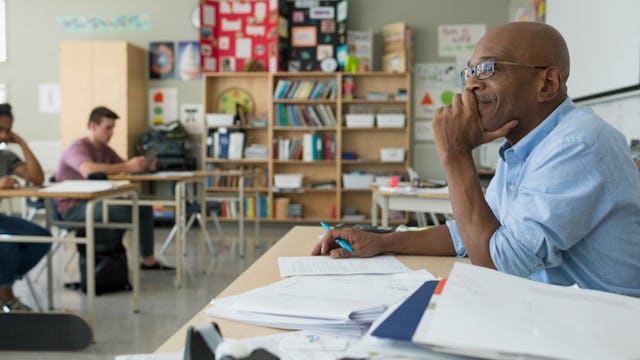Why My Job As A Teacher Is So Dangerous

My husband is a construction worker, often dangling by a harness over fifty feet in the air from the underside of a bridge, yet my job as a college teacher is more dangerous. As I walk through the hallways bustling with students staring at iPhones and chatting incomprehensibly about physics or biology, I can’t help but look them over.
What am I looking for? That one despondent face that won’t meet my gaze? An overly stuffed backpack? Someone who looks angry enough to kill as many of us as possible? What does that level of anger even look like?
I scan the faces brushing past me, mostly white, male, perfectly polished, smiles broad and handsome. They are some of the brightest 18 and 19-year-olds in the Northeast. Yet, I can’t help but worry that one of them may be using social media to display anger, torturing animals in his basement, or planning to kill us all, and that I’ll miss it. Then, there’s the educator in me, and with that the worry that I’m looking too carefully, assuming too much, profiling my own students.
I started at the University in 2013. My office was a converted closet on the fifth floor of the science building. In my department, we work with students who need certain accommodations. We help students with autism, ADHD, auditory disorders, and more. The first day in my new position, only six months after the shooting at Sandy Hook, I was sitting in my office when I heard the thunderous roar of what sounded like heavy, scary footsteps. My heart leapt to my throat and I immediately panicked. With no window in my office, it was hard to see what was happening. I didn’t know, in that split second, if I should barricade myself in or try to run. My hands started to shake. Tears welled in my eyes. I decided on the latter.
As I emerged from the office, I found two students, one sitting behind the reception desk and the other on the floor. They were laughing. The boy on the floor, let’s call him Anthony, had apparently done a series of three handsprings-causing that loud, thunderous shake.
“What are you doing? You scared me!” I cried out.
“Oh, that’s just Anthony. He needs to relieve his anxiety sometimes,” said the reception-desk student.
That fear and jumpiness and never really dissipated. In fact, I notice it’s been getting worse.
I’ve been teaching for a total of ten years. I’ve taught many reluctant writers, some even resentful at having to take my required course. I’ve taught writing at the local jail. But this semester, when a boy approached me after class with rage in his eyes and disgust on his breath, I panicked. I hate this class and the bitch who made me take it, he fumed. I froze. I heard his words, but his body language was louder than his voice: clenched fists, tightened jaw, shoulders forward.
I called my husband from the car shaking and sobbing. I thought I would never go back. I almost didn’t. The next day I reported him. He’s still here on campus, but not allowed in my classroom. Was that enough? What if he hurts someone else?, I wonder. Should I have done more? Should I have called the police? The FBI?
It’s always there, this phantom responsibility that has been thrust upon teachers.
Some believe I should become a criminal psychologist, the one who should notice something, who should be able to spot my killer as he slinks through the crowded hallways hiding in plain sight. I should be able to protect my students by being diligent, by being aware, by never looking the other way.
Some believe I should carry a gun. That I should be trained and ready to take the life of an active shooter at a moment’s notice. I earned an MFA so that I could help my students write about love, loss, life, death, grief, addiction, surrender, trauma, religion. I dissect poems and help students put words together in meaningful ways. I’m not even a full-time professor. I’m an adjunct. Besides, I’ve only held a gun once in my entire life. I was ten when my uncle gave me his rifle and instructed me to shoot a soda can about twenty-five feet away. The kickback left a deep purple mark on my young, smooth skin for weeks. I missed the can by a country mile.
Then, there are my own children. My twin, 12-year-old girls nestled safely away in their middle school only twenty miles from me. I wonder what their teachers know, and how they know it. Are they watching for signs? Are they feeling the rails for heat? My whole heart depends on them seeing something before it happens, just as my students’ parents depend on me to do. It’s an awesome responsibility, one they can’t teach you in graduate school.
About a year ago, my cell phone rang while I was at Wegman’s. My husband had fallen from our roof while shingling. After being rushed to the ER, he was released with only a sprained wrist.
“I got sloppy,” he later told me in the car on the ride home. “I was getting tired, but, I wanted to finish.”
I thought about the consequences of my own sloppiness. What If I overlook a comment, ignore a Tweet, or misread a cold stare? Would people die? My students can die. I can die. And for a moment, the enormity of those consequences filled me. Suddenly, the weight of being a teacher felt heavy on my shoulders as we drove through the darkness.
This article was originally published on